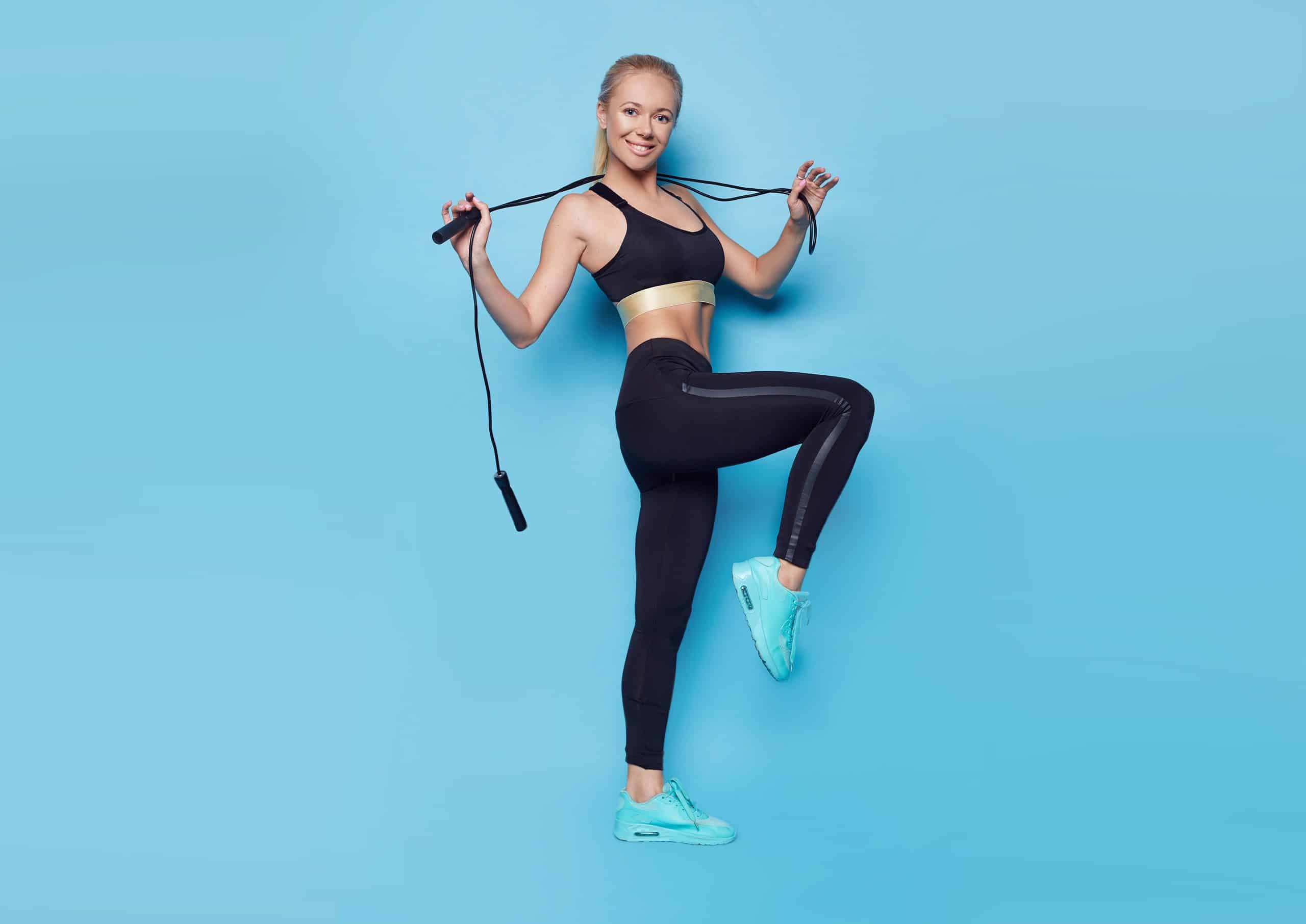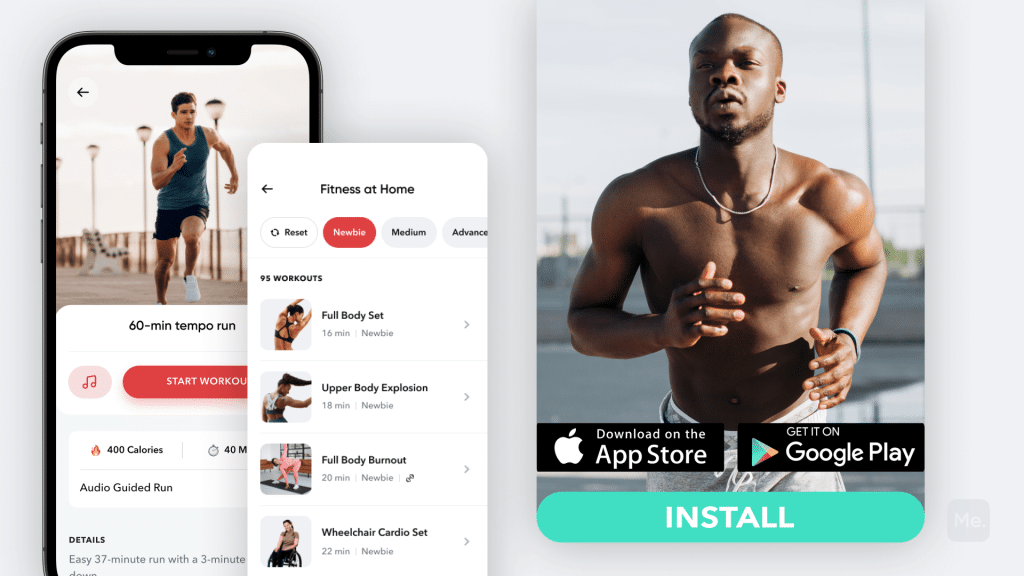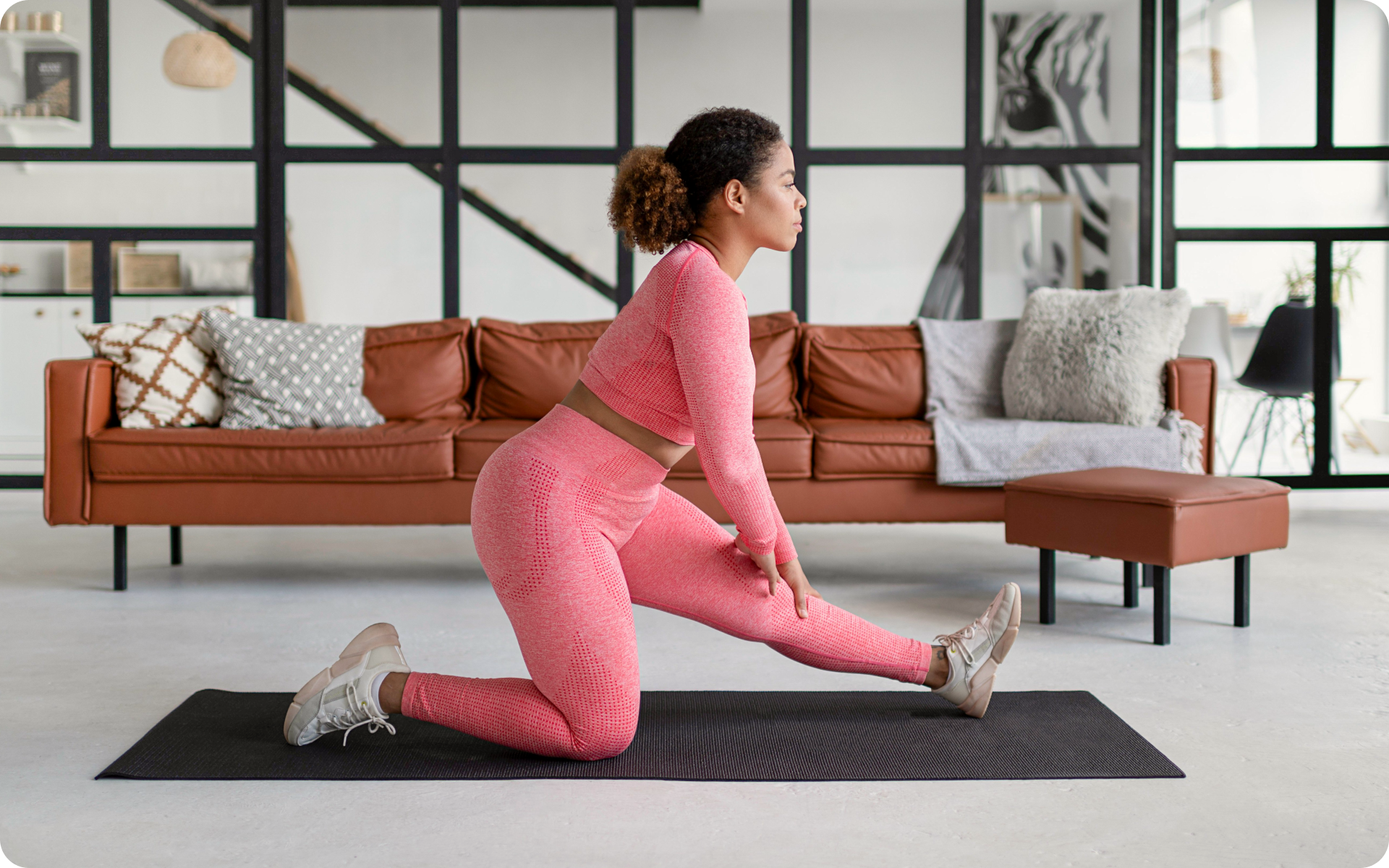“I want to lose some weight” is a popular answer when you ask someone why they are exercising. This, however, is not what you subconsciously want to do. Consciously, you want to step on that scale and see the numbers down by a few pounds. That is, after all, what losing weight means (literally). However, what you should want to do is lose fat. Losing weight often involves dropping the extra fats and some muscle mass too. Ultimately, this is not a desirable position to be in. So is it possible to burn fat but not muscles, when losing weight? Let’s find out.
Get your personalized
meal plan!
Weight Loss Vs. Fat Loss
It’s no lie that losing weight can be a daunting task. From the dietary changes to the increased intensity and frequency of workouts, weight loss demands a major overhaul in your lifestyle. However, you must understand the difference between losing weight and losing fat. Doing that will help you achieve your fitness goal safely and efficiently.
Your total body weight comprises the total mass of water, muscles, and fats in your body. So when you go on a weight loss quest, the chances are high that all three masses may drop. This, however, should not be your goal as it may result in serious health issues. You should aim to lose fats while gaining muscles simultaneously.
So what is the best way to lose fat, and why is muscle gain that important? Muscle gain is essential because they are a critical component of body movement and function. Any drop in muscle mass will adversely affect your strength and endurance levels.
But here’s the good news: Ideally, your body will use up fats before muscles. If you try to lose weight by not eating, that’s when your body will start digging into your muscles for energy.
Therefore, food should not be your enemy in your weight loss journey. You need it. The only way you get to lose weight while gaining muscles is by proper dieting and exercising. Do not restrict any food, and make sure you get a balanced diet consisting of all the macros.
Simply put:
- Losing weight can result in a drop in both fats and muscle mass.
- Losing fat should be the ultimate goal in your weight loss journey, not losing muscle mass.
- Simultaneously losing fats and gaining muscles is possible. You just need the right combination of a healthy diet and good exercise.
Read More: 21-Day Fat Loss Challenge: It’s All About Inches, Not Pounds
The lose fat gain muscle discussion has been around for some time now. And for a good reason too: People want to understand how best to lose fats while gaining muscles. Well, here are some tips on how to lose fat and gain muscle safely in your weight loss journey:
Increase Your Protein Intake
Whenever you’re cutting down on calories, you should ensure that little to none of it should come from proteins. Proteins are an essential nutritional stimulus when it comes to building and maintaining muscle mass. Additionally, proteins will increase your satiety, basically making you stay full for longer.
So when you increase your protein intake, you’ll naturally eat fewer calories. This then creates a domino effect where you’re actively building your muscles while losing weight. Also, remember that muscle burns fat. Therefore, gaining more muscles results in a win-win situation. Sweet, right?
For instance, a study was done between two groups of men cutting down on calories while exercising. The first group followed up with a high-protein diet, while the second was put on a lower-protein diet. The first group ended up losing an average of 10.56 pounds of fat while gaining 2.64 pounds of muscle. However, the second group lost an average of 7.7 pounds of fat while gaining less than a quarter pounds of muscle (2).
How much protein your body will need daily is dependent on several factors. So there is no universal figure for that. However, one review suggests between 0.4 to 0.55 grams of protein per kilogram of your body weight in every meal spread across at least 4 meals per day. This would add up to 1.6-2.2 grams of protein per kg of body weight per day. That amount could go a long way in ensuring optimal muscle growth and development (3).
Don’t Ignore Your Carbs
When it comes to losing weight and gaining muscles, low-carb diets are unnecessary. Sure, you may want to get in on it, but you don’t need it to achieve your goals. You may end up impairing your muscle growth and maintenance in the long term by restricting your carbs intake.
Limiting your carb intake may end up reducing your glycogen levels. This is not an ideal situation since it may end up leading to muscle loss. Carbs can be used as part of both your pre-workout and post-workout nutrition. Here’s how:
Carbs As Part Of Your Pre Workout Nutrition
Glucose from carbs is your muscles’ most preferred source of fuel. Glucose is stored in the form of glycogen around your liver and muscles. It is this energy reserve that your muscles use up during short and high-intensity exercises. Eating carbs a few hours before you work out will increase your glycogen levels, firing you up through the workout (10).
Carbs As Part Of Your Post Workout Nutrition
Usually, after an intense workout session, your muscle fibers are worn out, and your energy reserves are depleted. Taking carbs after your workout boosts your recovery and enhances the quality of your workouts while repairing your muscles (10).
Also, your metabolism and insulin sensitivity is highest after working out. That means your body’s ability to tolerate carbs will also be at its peak.
Include Strength And Resistance Training In Your Workout Routines
Losing fat while gaining muscle is all about the perfect and delicate combination of exercise and diet. That being said, the type of exercise you incorporate into your workout routine is very important. Cardiovascular exercises primarily target your aerobic muscle fibers. It will increase your oxygen concentration without significantly changing your muscle mass.
Strength training, however, is largely famed for building muscles when there’s a caloric surplus in your body. Studies indicate that resistance training can significantly reduce declines in muscle mass when you have a caloric deficit (7). Unlike aerobic exercises, strength training has several benefits when it comes to building muscle mass.
For starters, a heavily loaded strength training workout enhances the development of type 2 muscle fibers. These fibers greatly increase muscle mass gain and preservation. Next, strength training will trigger the production of hormones like testosterone and the human growth hormone. These hormones facilitate muscle retention and growth.
To realize the full benefits of strength training, try to get in about two to three sessions of the exercise weekly. You can combine bodyweight exercise, weightlifting, and resistance band exercises at different intervals. Finally, start with manageable reps and lighter low weights, gradually increasing your reps and weights.
Want to build an attention-grabbing bubble butt, blast away fat that’s stored in all the wrong places, spring-clean your diet, turn back the clock on your skin, skyrocket your self-confidence and shatter your insecurities? Check out the BetterMe app and set this plan in motion!
Recovery Should Always Be A Priority
Building and sculpting your body requires a lot of effort. You always need to push yourself every day to get a muscular physique to hit the beach. However, what most people don’t get is that building your muscles doesn’t happen during workouts. It happens in between them.
Recovery is perhaps the most overlooked and most important aspect of exercise. Why? You ask. To answer that, let’s first look at what recovery is. Ideally, recovery involves exercises carried out after or in some cases between workouts to cool down your muscles.
Recovery can either be immediate between exertion like reps, short-term between bouts like circuits, or training between workouts. In this case, training recovery will be our focus since it has the most benefits in building muscles. This type of recovery normalizes your heart rate and blood pressure.
It also speeds up the replenishment of your energy stores along with your cellular enzymes. Functionally, you can think of it as a return point where your body matches or exceeds its previous performance. This should be your goal when trying to recover after exercise.
But what exactly are the benefits of recovery after working out? Let’s find out.
Recovery Replenishes Your Energy Stores
Your body cells ideally run on the same energy source- Adenosine Triphosphate (ATP). During intense workouts, ATP is either produced through the phosphagen system or the glycolytic system. The energy system that you use varies depending on the duration and intensity of your workout. If your workout involves snatches or sprints, then you’ll use up the phosphagen system (6).
However, for longer, more intense exercises like 800-meter repeats, you’ll burn through your glycogen. Failing to replenish these reserves before your next session leads to poor performance marred with fatigue. Recovery periods allow your body to supply essential nutrients to every muscle, thus facilitating energy replenishment.
Recovery Allows Your Body To Clear Out Metabolic Byproducts
The production of ATP is accompanied by the building up of metabolic byproducts like lactic acid. When it starts accumulating in your muscles during exercises, it inhibits ATP production and impairs muscle contraction (6). Until this lactic acid is cleared from your muscles, your performance will suffer.
Recovery Allows Your Damaged Muscles To Be Repaired
Intense training will damage your muscles and create microtears. It will also rough up everything from your contractile proteins to your connective tissues. As much as that sounds scary, it’s quite normal.
However, until your muscles are completely repaired, they won’t be able to generate peak force. Also, the transportation of glycogen to your cells will be slowed down. Recovery gives your body time to repair itself back to mint condition.
So what can you do to facilitate your body’s recovery process properly? Here are some tips on how to recover after working out:
Perform Light Exercises
Active recovery removes metabolic byproducts faster than passive recovery. Try light and simple exercises like yoga, easy runs, and hikes on your rest days to actively recover.
Try Massage, Foam Rolling
Massage and foam rolling will help your body break up scar tissues while boosting blood circulation in your body. It will also increase your range of motion, improve your mobility and reduce muscle soreness. The bonus? They feel really good.
Feed Your Muscles
Meals or snacks that contain protein mixed with antioxidants and healthy carbs can speed up the recovery process after a workout. Blueberries, cherries, milk, and pomegranates all exhibit promising results when it comes to post-workout recovery.
If you’re wondering, “ why am I losing weight without gaining muscle mass,” probably it’s because you don’t get enough recovery time. Inadequate recovery time may lead to serious muscle injury and degeneration. So the next time you work out, be sure to pause and recover afterward.
Read More: How To Recover From Overtraining And Why Skipping Rest Days Isn’t The Answer
Maintain A Reasonable Caloric Deficit
If you’re on a quest to burn fat and gain muscles, it’ll probably do you good if you avoid crash diets. That’s because you’ll always end up losing muscle mass in these types of diets no matter what you do. Crash diets will deprive you of the necessary nutrients needed to heal your muscles and recover after working out.
You’d also be exposing yourself to health issues that may arise from overtraining without proper recovery. Cutting after a bulking period and retaining muscles to show for it can be particularly tricky. You should try to maintain a deficit of no more than 500 calories. At that caloric deficit, you’ll start losing fat without sacrificing your muscle size and strength gains (4).
To know whether you’re moving in the right direction, make sure you track your progress from time to time. You can do this by taking circumference measurements and body fat percentages.
Drink Branched-Chain Amino Acids (BCAAs)
Branched-chain Amino Acids are essential amino acids and therefore have to come from your diet. BCAAs are important building blocks of protein which are mostly broken down within your muscles. They can then be used as a source of energy during workouts.
When you’re in your cutting phase, you can use them as an alternative to high-calorie protein powders.
Get Enough Quality Sleep
All the hard work put into working out and dieting could go down the drain if you don’t get quality sleep. Yes, sleep is that important. Poor sleepers don’t burn fats and build muscles as efficiently as people who sleep well at night. You may also end up feeling hungry at odd hours, which will increase the chances of you overeating.
Your muscles are repaired and rebuilt mostly at night when you’re sleeping. This, therefore, makes it the best time for recovery after a day of intense activities. Your growth hormone is secreted throughout the day, but its peak is at night when your sleep is deepest. Getting short and interrupted periods of sleep only short-changes your muscle growth and repair.
Cortisol, which is an inflammatory hormone, is increased when you’re sleep-deprived (9). When cortisol is in high quantities in your body, it can enhance muscle degradation while inhibiting weight loss.
Multiple studies back up the effect of quality sleep on losing weight and gaining muscle. In one study, the sleeping habits of 1024 people were keenly observed. Those with short sleep patterns were observed to have altered levels of hormones controlling appetite regulation which would likely increase their appetites. Also, increased BMI was found to be proportional to decreased sleep (8).
In another study, two groups of dieters were subjected to different hours of sleep- 5.5 hours and 8.5 hours. Those who got less sleep lost less fat and more fat-free mass (c). According to another study, one week of sleep deprivation can cause significant drops in your body’s insulin sensitivity (9).
Reduced insulin sensitivity increases the risk of fat storage while inhibiting the body’s growth hormone production.
When it comes to weight loss, progress is made by inches, not miles, so it’s much harder to track and a lot easier to give up. BetterMe app is your personal trainer, nutritionist and support system all in one. Start using our app to stay on track and hold yourself accountable!
Always Stay Hydrated
Does drinking water help when it comes to losing weight? Well, no one is saying you’ll wake up lighter by sipping before going to bed. However, in the long run, staying hydrated will have a significant impact on weight loss. Here’s how:
Water Is A Natural Appetite Suppressant
Whenever you’re hungry, you instinctively try to find food. However, this may not always be the answer. Sometimes your brain mistakes thirst for hunger. Drinking water will therefore decrease your appetite when you’re low in water, not calories. This ultimately can reduce your calorie intake, sparking fat loss (11).
Drinking Water Stimulates Your Metabolism
If you’re wondering how to burn fat naturally, not muscles, then drinking plenty of water is your answer. In one study, 50 overweight girls drank 2 cups of water an hour before every meal. It was observed that there was significant weight loss and reductions in their BMIs without any dietary changes (1). Is there science behind it?
Drinking water stimulates thermogenesis, particularly when it’s chilled. Your body then spends energy to warm the fluid to body temperature. The more energy is spent, the higher your metabolism gets. Higher metabolic rates are then translated into faster calorie burn (11).
Your Body Needs Water To Burn Fats
Sometimes how to burn fat may be as simple as staying hydrated. Increasing your water intake may enhance lipolysis, which is the process by which your body burns fat for energy. Mild dehydration, on the other hand, will slow down lipolysis, maybe due to hormonal changes. Staying hydrated could eventually translate into a steady drop in your body weight (11).
Conclusion
When it comes to fat vs muscle regarding weight loss and which should be given priority, we say both. The two masses are equally important to lose weight safely and effectively. You need to strike a balance between burning fat and gaining muscles.
However, do not approach them as separate entities. The question should be how to reduce body fat and increase muscle mass simultaneously. It’s possible, and it works. Ultimately, it all lies in how you exercise and what you eat. Try these weight loss tips today to burn fat not muscle, in a natural, safe and effective way.
DISCLAIMER:
This article is intended for general informational purposes only and does not address individual circumstances. It is not a substitute for professional advice or help and should not be relied on to make decisions of any kind. Any action you take upon the information presented in this article is strictly at your own risk and responsibility!
SOURCES:
- Effect of ‘water induced thermogenesis’ on body weight, body mass index and body composition of overweight subjects (2013, pubmed.gov)
- Higher compared with lower dietary protein during an energy deficit combined with intense exercise promotes greater lean mass gain and fat mass loss: a randomized trial (2016, academic.oup.com)
- How much protein can the body use in a single meal for muscle-building? Implications for daily protein distribution (2018, pubmed.gov)
- How to safely and effectively create a calorie deficit for weight loss (2020, medicalnewstoday)
- Insufficient sleep undermines dietary efforts to reduce adiposity (2011, nih.gov)
- Muscular Exercise, Lactic Acid, and the Supply and Utilization of Oxygen (1993, pubmed.gov)
- Resistance Training Conserves Fat-Free Mass and Resting Energy Expenditure Following Weight Loss (2012, onlinelibrary.wiley.com)
- Short Sleep Duration Is Associated with Reduced Leptin, Elevated Ghrelin, and Increased Body Mass Index (2004, nih.gov)
- Sleep Restriction for 1 week Reduces Insulin Sensitivity in Healthy Men (2010, nih.gov)
- The use of carbohydrates during exercise as an ergogenic aid (2013, pubmed.gov)
- Yes, drinking more water may help you lose weight (2020, jhu.edu)















